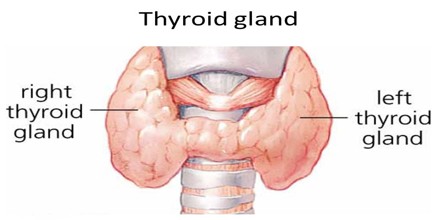
Thyroid disease:
Thyroid is a small butterfly-shaped gland found at the base of our neck, just below our Adam’s apple. This gland makes thyroid hormone that travels in our blood to all parts of our body. The thyroid hormone controls our body’s metabolism in many ways, including how fast we burn calories and how fast our heart beats.
Symptoms of thyroid problems:
Just as the types of thyroid conditions can vary, so can the symptoms of thyroid problems. Here, we have listed few common symptoms of thyroid disease:
- Nervousness and tremor: These symptoms, along with agitation, can signal an over function of the thyroid gland (hyperthyroidism).
- Mental fogginess and poor concentration: Mental functioning can be affected in both hyperthyroidism (elevated levels of thyroid hormone) and hypothyroidism (too low levels of thyroid hormones). While sluggishness and depressed mood are often associated with hypothyroidism, hyperthyroidism can also lead to a reduced capacity for concentration.
- Menstrual changes: Hypothyroidism is sometimes associated with excessive or prolonged menstrual bleeding, while hyperthyroidism can be characterized by scanty or reduced menstrual flow.
- Feeling bloated: Fluid retention is often a sign of an underactive thyroid gland.
- Racing heartbeat: An increased heart rate (tachycardia) and palpitations can be symptoms of hyperthyroidism.
- Aches and pains: Muscle aches and pain can accompany different types of thyroid problems.
- Weight gain: A modest amount of weight gain often accompanies conditions in which thyroid gland activity is lower than normal.
- High cholesterol levels: An increase in blood cholesterol levels can occur in individuals with hypothyroidism.
- Heat intolerance: People with an overactive thyroid gland often complain of intolerance to higher temperatures.
- Feeling cold: Conversely, those with an under functioning thyroid may feel constantly cold.
It is important to remember that none of these symptoms is absolutely specific for thyroid disease. All of them may be caused by a number of different conditions and normal states. Your health care professional can order laboratory tests to evaluate the function of your thyroid gland if you have troubling symptoms.
Continue viewing https://OurHealth.site to get tips to cure Thyroid.

Leave a Reply